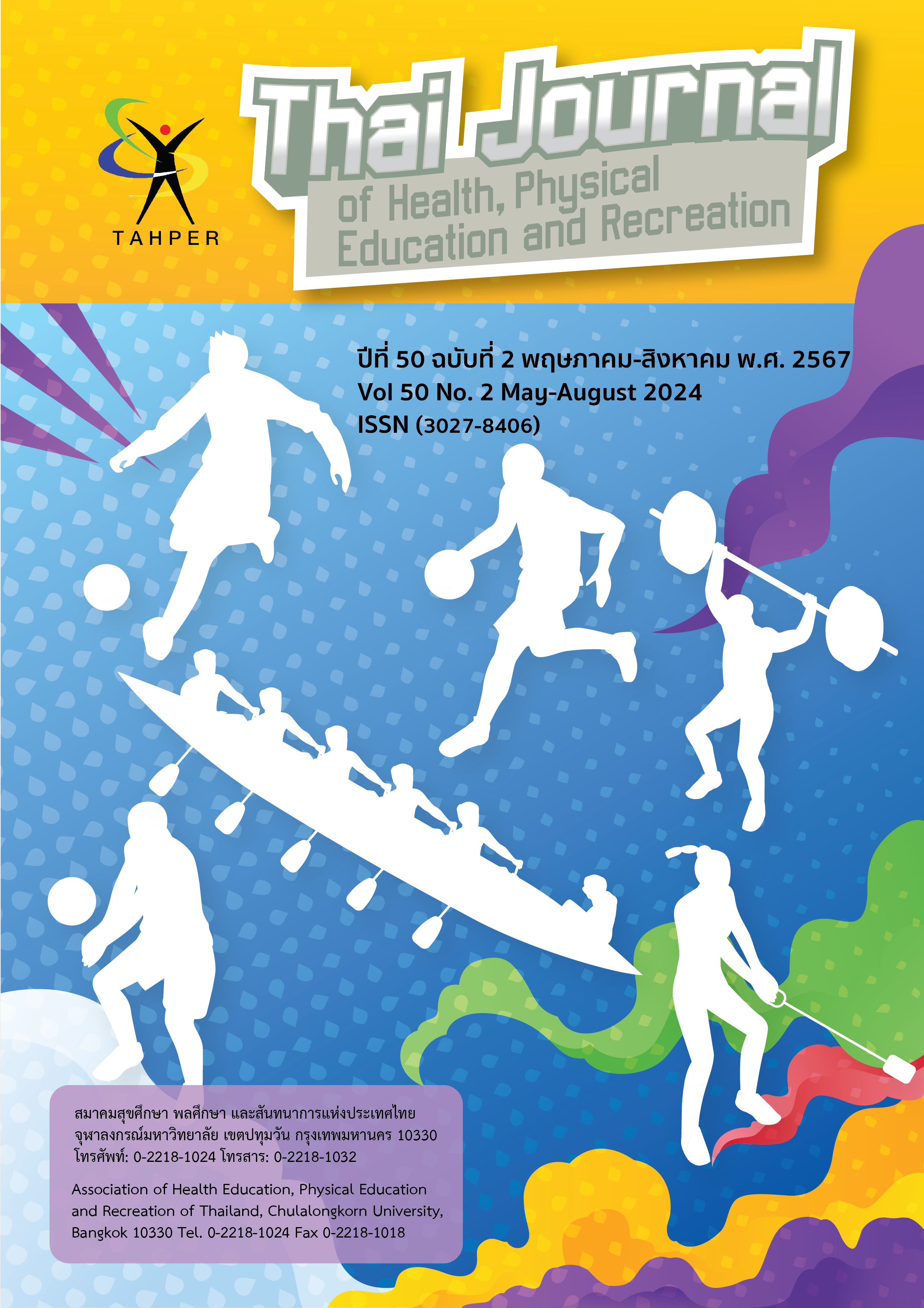Effectiveness of Health Promotion Program for Dietary Behavior Of Overweight Students at Lower Secondary School Students
Main Article Content
Abstract
The purpose of this quasi-experimental research was to study the effectiveness of Health Promotion Program for Dietary Behavior of Overweight Students at Lower Secondary School Students. Health Promotion and Health Education behavior in secondary school students. Sixty of Lower Secondary School Students were selected by multistage sampling method to be the subjects in this study. The subjects were systematic sampling assigned to the experimental group and comparison group.There were thirty subjects in each group equally.The experimental group participated in active learning management activities for 6 weeks. The comparison group participated in regular health education class. Questionnaire developed by the researcher was used as an instrument to collect data. Data analysis was made for frequency, percentage, mean, standard deviation, Paired – samples t – test and Independent – samples t – test. The results of the study revealed that after the experiment. The experimental group had a higher average dietary behavior Transmission than before the experiment. (p < .05).The experimental group had a higher average dietary behavior Transmission than before the experiment. (p < .05)
Article Details

This work is licensed under a Creative Commons Attribution-NonCommercial-NoDerivatives 4.0 International License.
Critical thinking in journals is the right of the author. The Association of Health Education, Physical Education and Recreation of Thailand is not always required, to create diversity in ideas and creativity.
ความคิด ข้อวิพากษ์ในวารสารเป้นสิทธิของผู้เขียน สมาคมสุขศึกษา พลศึกษา และสันทนาการแห่งประเทศไทยไม่จำเป็นต้องเห็นชอบด้วยเสมอไป เพื่อให้เกิดความหลากหลายในความคิดและความสร้างสรรค์
References
กรมควบคุมโรค กระทรวงสาธารณสุข. 2562. รายงายาภานการณ์โรค NCDs พ.ศ. 2562. (พิมพ์ครั้งที่ 1).กรุงเทพฯ: สำนักพิมพ์อักษรกราฟฟิคแอนด์ดีไซน์.
กรมอนามัย กระทรวงสาธารณสุข. (2558). แนวทางการคัดกรอง ส่งต่อและแก้ปัญหาเด็กอ้วนกลุ่มเสี่ยงในสถานศึกษา สถานบริการสาธารณสุข และคลินิก DPAC. สืบค้นเมื่อ 1 ตุลาคม 2562, สืบค้นจาก http://nutrition.anamai.moph.go.th/nutrition/ewt_news.php?nid=111
จตุพร จำรองเพ็ง. (2560). ผลของโปรแกรมควบคุมน้ำหนักต่อพฤติกรรมการบริโภคอาหารพฤติกรรมการมีกิจกรรม ทางกาย และน้ำหนักตัวของเด็กวัยเรียนตอนปลายที่มีภาวะน้ำหนักเกิน. วิทยานิพนธ์มหาบัณฑิต สาขาการวิชาพยาบาลเวชปฏิบัติชุมชน, มหาวิทยาลัยธรรมศาสตร์.
จิราภรณ์ เรืองยิ่ง. (2559). พฤติกรรมการบริโภคอาหารของวัยรุ่นในจังหวัดสงขลา: การสังเคราะห์องค์ความรู้และปัจจัยที่มีอิทธิพลต่อพฤติกรรมการบริโภคอาหาร. วารสารศิลปะศาสตร์, 8(1), 245-264.
ปวีณภัทร นิธิตันติวัฒน์. (2560). พฤติกรรมการบริโภคอาหารของวัยรุ่นไทย ผลกระทบและแนวทางแก้ไข. วารสารวิทยาลัยพยาบาลพระปกเกล้า, 28(1), 122-128.
ศิรดา เสนพริก. (2560). ผลของโปรแกรมสุขศึกษาโดยประยุกต์ใช้ทฤษฎีความสามารถของตนเองในเด็กที่มีภาวะน้ำหนักเกิน ระดับประถมศึกษาปี ที่ 6 โรงเรียนขจรเกียรติศึกษา จังหวัดภูเก็ต. วารสารการพัฒนาสุขภาพชุมชน, 5(2), 297–314.
สำนักงานสถิติแห่งชาติ กระทรวงดิจิทัลเพื่อเศรษฐกิจและสังคม. (2560). การสำรวจพฤติกรรมการบริโภคอาหารของประชากร พ.ศ. 2560. (พิมพ์ครั้งที่ 1). กรุงเทพฯ: สำนักพิมพ์กองสถิติพยากรณ์.
Bandura A. (1977). Self-efficacy: Toward a unifying theory of behavioral change. Psychological Review, 84(2), 191–215.
Cohen and J. (1977). Statistical Power Analysis for Behavioral Sciences. Academic Press, New York. Elling, Whittemore, R., Green and M. 1960. Patient participation in a pediatric program. Journal of Health and Human Behavior, 1(1), 183-91.


